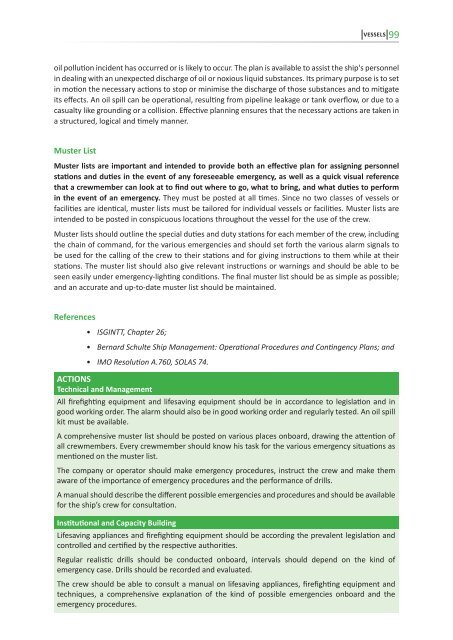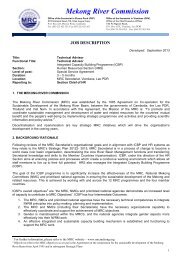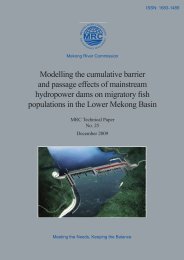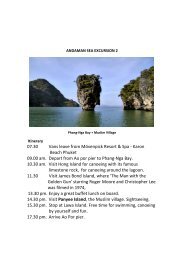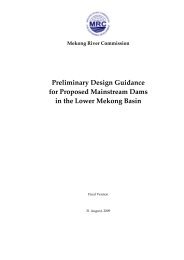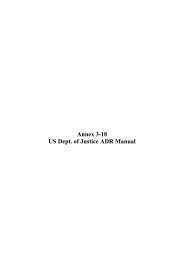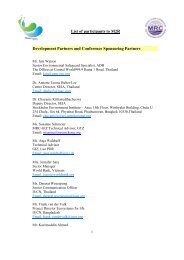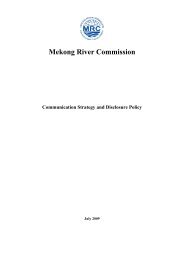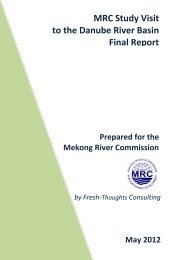Carriage, Handling and Storage of Dangerous Goods along
Carriage, Handling and Storage of Dangerous Goods along
Carriage, Handling and Storage of Dangerous Goods along
Create successful ePaper yourself
Turn your PDF publications into a flip-book with our unique Google optimized e-Paper software.
VESSELS 99<br />
oil pollution incident has occurred or is likely to occur. The plan is available to assist the ship's personnel<br />
in dealing with an unexpected discharge <strong>of</strong> oil or noxious liquid substances. Its primary purpose is to set<br />
in motion the necessary actions to stop or minimise the discharge <strong>of</strong> those substances <strong>and</strong> to mitigate<br />
its effects. An oil spill can be operational, resulting from pipeline leakage or tank overflow, or due to a<br />
casualty like grounding or a collision. Effective planning ensures that the necessary actions are taken in<br />
a structured, logical <strong>and</strong> timely manner.<br />
Muster List<br />
Muster lists are important <strong>and</strong> intended to provide both an effective plan for assigning personnel<br />
stations <strong>and</strong> duties in the event <strong>of</strong> any foreseeable emergency, as well as a quick visual reference<br />
that a crewmember can look at to find out where to go, what to bring, <strong>and</strong> what duties to perform<br />
in the event <strong>of</strong> an emergency. They must be posted at all times. Since no two classes <strong>of</strong> vessels or<br />
facilities are identical, muster lists must be tailored for individual vessels or facilities. Muster lists are<br />
intended to be posted in conspicuous locations throughout the vessel for the use <strong>of</strong> the crew.<br />
Muster lists should outline the special duties <strong>and</strong> duty stations for each member <strong>of</strong> the crew, including<br />
the chain <strong>of</strong> comm<strong>and</strong>, for the various emergencies <strong>and</strong> should set forth the various alarm signals to<br />
be used for the calling <strong>of</strong> the crew to their stations <strong>and</strong> for giving instructions to them while at their<br />
stations. The muster list should also give relevant instructions or warnings <strong>and</strong> should be able to be<br />
seen easily under emergency-lighting conditions. The final muster list should be as simple as possible;<br />
<strong>and</strong> an accurate <strong>and</strong> up-to-date muster list should be maintained.<br />
References<br />
• ISGINTT, Chapter 26;<br />
• Bernard Schulte Ship Management: Operational Procedures <strong>and</strong> Contingency Plans; <strong>and</strong><br />
• IMO Resolution A.760, SOLAS 74.<br />
ACTIONS<br />
Technical <strong>and</strong> Management<br />
All firefighting equipment <strong>and</strong> lifesaving equipment should be in accordance to legislation <strong>and</strong> in<br />
good working order. The alarm should also be in good working order <strong>and</strong> regularly tested. An oil spill<br />
kit must be available.<br />
A comprehensive muster list should be posted on various places onboard, drawing the attention <strong>of</strong><br />
all crewmembers. Every crewmember should know his task for the various emergency situations as<br />
mentioned on the muster list.<br />
The company or operator should make emergency procedures, instruct the crew <strong>and</strong> make them<br />
aware <strong>of</strong> the importance <strong>of</strong> emergency procedures <strong>and</strong> the performance <strong>of</strong> drills.<br />
A manual should describe the different possible emergencies <strong>and</strong> procedures <strong>and</strong> should be available<br />
for the ship’s crew for consultation.<br />
Institutional <strong>and</strong> Capacity Building<br />
Lifesaving appliances <strong>and</strong> firefighting equipment should be according the prevalent legislation <strong>and</strong><br />
controlled <strong>and</strong> certified by the respective authorities.<br />
Regular realistic drills should be conducted onboard, intervals should depend on the kind <strong>of</strong><br />
emergency case. Drills should be recorded <strong>and</strong> evaluated.<br />
The crew should be able to consult a manual on lifesaving appliances, firefighting equipment <strong>and</strong><br />
techniques, a comprehensive explanation <strong>of</strong> the kind <strong>of</strong> possible emergencies onboard <strong>and</strong> the<br />
emergency procedures.


